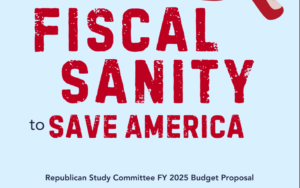Politico's Caitlin Emma and Jennifer Scholtes reported Monday that "House Republicans have pulled two government funding bills scheduled for a floor vote this week, signaling further peril for leadership's doomed…
Republican Study Committee Budget Targets SNAP, Crop Insurance
A proposed 2025 budget from the Republican Study Committee — the largest conservative caucus in the U.S. House of Representatives — would cap crop insurance subsidies a single farmer may receive to $40,000, provide PLC and ARC payments only to farms with gross income below $500,000 and convert funding for the Supplemental Nutrition Assistance Program to state block grants.
The Fiscal Times’ Michael Rainey reported that “the budget has little chance of becoming law but provides a sense of the policies Republicans may pursue if they retain control of the House in 2025, and possibly expand their power to include the Senate and the White House.”
The budget, according to a press release from the 166 members of the RSC “is a thorough plan to address our federal spending problem and start paying down our debts. The FY-25 budget balances in just seven years, cuts spending by $17.1 trillion over ten years, and reduces taxes on Americans by $4.2 trillion over ten years.” Currently, 20 out of the 29 members of the House Agriculture Committee count themselves as members of the RSC.
The proposed budget says that “America’s farmers would thrive under the RSC Budget’s package of pro-growth tax reforms and deregulatory measures. These changes include repealing the estate tax, indexing capital gains, extending the pass-through tax deduction of the TCJA, making bonus depreciation permanent, permanently applying the EBITDA (earnings before interest, tax, depreciation, and amortization) definition of income for determining the net interest deduction, and accelerating the current depreciation schedule for nonresidential construction. The RSC Budget also would also advance deregulatory reforms to the Clean Air Act, Clean Water Act, and Endangered Species Act.”

Here are some highlights of the proposals in the budget package:
Commodity Subsidy Program Reform
“The RSC Budget would support capping payments from ARC and PLC to only farms with an adjusted gross income below $500,000,” the budget reads. “This was a policy proposed in the FY 2021 Trump Budget and would ensure that commodity support payments are going to smaller farms that may struggle obtaining capital from private lenders.”
Crop Insurance Reform
“The RSC Budget would adopt President Trump’s proposal to modestly reduce the federal share of crop insurance premiums by 14 percent,” the budget said. “This proposal is estimated to save taxpayers roughly $23 billion over ten years.”
“Additionally, under the RSC Budget, federal crop insurance subsidies would only be offered to pay for catastrophic policies,” the budget proposal said.
“The RSC Budget also supports President Trump’s 2018 budget proposal to cap the overall amount of crop insurance subsidies a single farmer may receive to $40,000,” the budget reads. “This reform is estimated to save taxpayers $16.2 billion over ten years.”
SNAP Reform
“Using the successful 1996 reform of TANF as a model, this budget would convert SNAP into a discretionary block grant to the states based on rates of unemployment, poverty, and the length of time beneficiaries receive aid,” the budget reads. “Under this model, States would have flexibility to administer their own programs subject to several commonsense requirements to ensure program effectiveness and viability. An enhanced state cost share would be integrated into this block grant approach.”
The budget also says that it “supports expanding the work requirement even further, applying it to 18–65-year-olds. This reform is particularly important given the low
percentage of workers currently subject to work requirements and the significantly lower labor force participation rate of 65.2% for those aged 55-64.”
Eliminate Conservation Programs
The proposed budget would “prohibit new enrollments” in both the Conservation Reserve Program and Conservation Stewardship Program. The budget would also eliminate the Conservation Technical Assistance Program, which the budget says “uses taxpayer dollars to provide subsidies to landowners for conservation purposes.” The USDA says the CTA “provides our nation’s farmers, ranchers and forestland owners with the knowledge and tools they need to conserve, maintain and restore the natural resources on their lands and improve the health of their operations for the future.”
Eliminate Other Programs
The proposed budget would eliminate federal dairy subsidy programs, including “programs to pay dairy farmers when prices decline, buy products from the market to maintain price levels, and limit the importation of dairy products.”
The proposed budget would also phase out the U.S. sugar program “should foreign countries stop subsidizing sugar production.”
Reaction to the Budget
While there has been little reaction to the agriculture portions of the budget proposal, the Washington Post’s Maegan Vazquez reported that “President Biden and fellow Democrats wasted little time lambasting a budget proposal from a large group of House Republicans that would, among other things, raise the retirement age for Social Security and endorse a bill that would codify that life begins at conception.”
Rainey reported that “Biden vowed to fight the RSC agenda. ‘Let me be clear: I will stop them,’ he said.”





